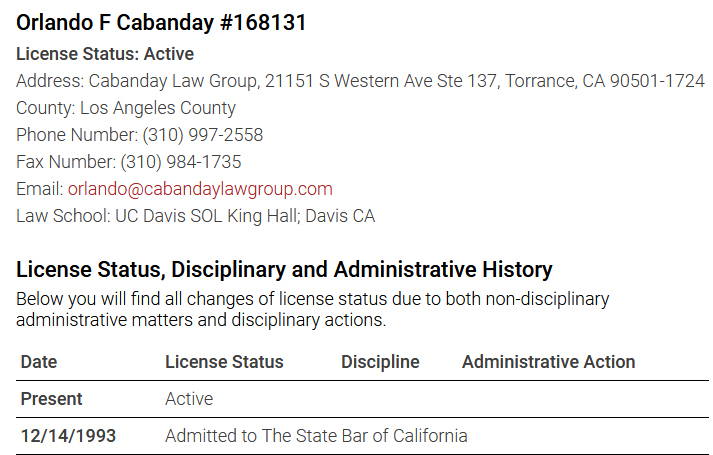Contreras v. Cooledge, Orange County Superior Court Case Number 30-2017-00941294.
From the appellate court's decision and online county court docket it is Lawzilla's understanding the following occurred:
Attorney Orlando Cabanday is listed as the attorney representing the plaintiff and appellant.
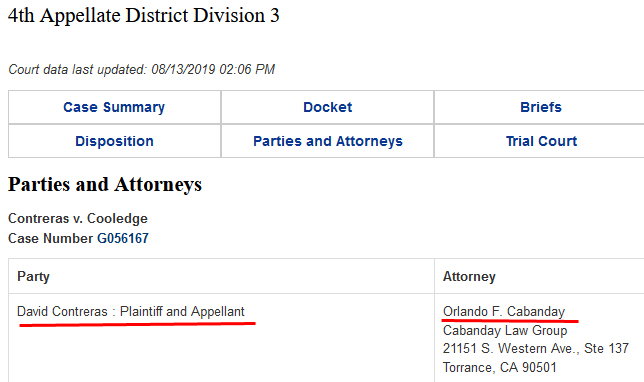
The case docket lists the Cabanday firm as being involved in the case from the day it was first filed.


The lawsuit filed by the Cabanday law firm was for slander of title. The defendants were the plaintiff's brother and another attorney.
The defendants filed an anti-SLAPP motion which the trial court granted.
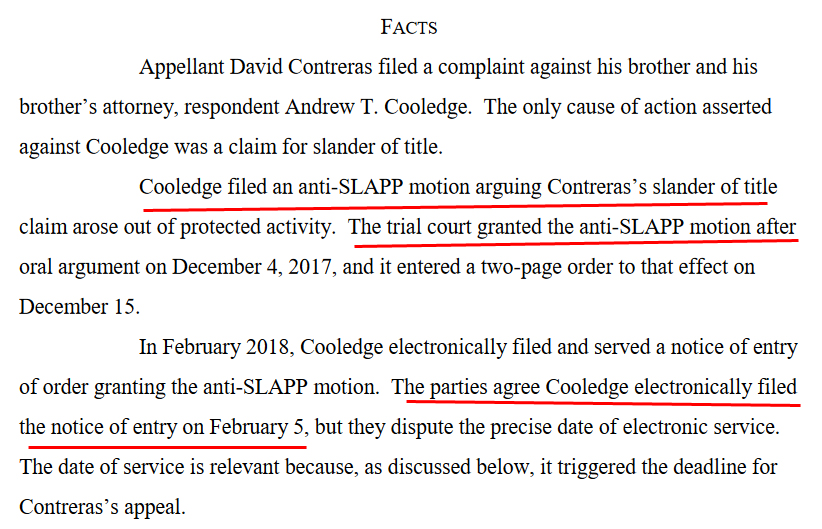
Defendant filed served notice of the order on February 5th.
Cabanday's client thus had 60 days, or April 6th, to file an appeal.
Cabanday, however, did not file an appeal until April 9th.
The court of appeals held the appeal was untimely and dismissed the appeal.


Now the really interesting part of this case ...
There was a typo on the proof of service listing February 15th instead of February 5th.
Attorney Orlando Cabanday claimed his appeal was timely - within 60 days after February 15th.
However, the electronic records confirmed the proof of service was actually on February 5th.
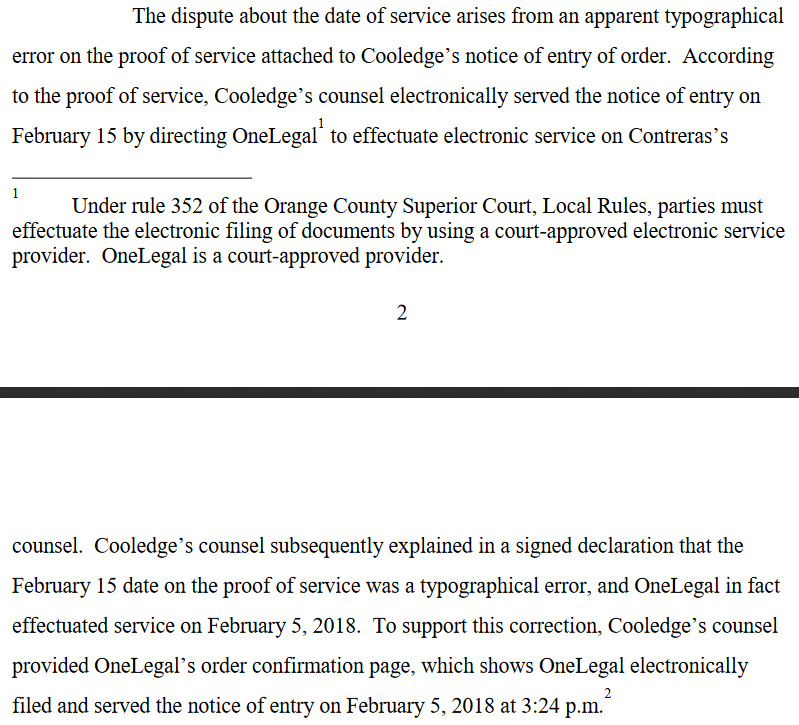
Then the court of appeals said this about attorney Orlando Cabanday:
"Contreras's counsel’s declaration is oddly silent, however, about when he actually received Cooledge's notice of entry of order. Further, Contreras's counsel has not provided an internally date-stamped copy of what was served on him, nor does he contend OneLegal electronically served him at an incorrect e-mail address."
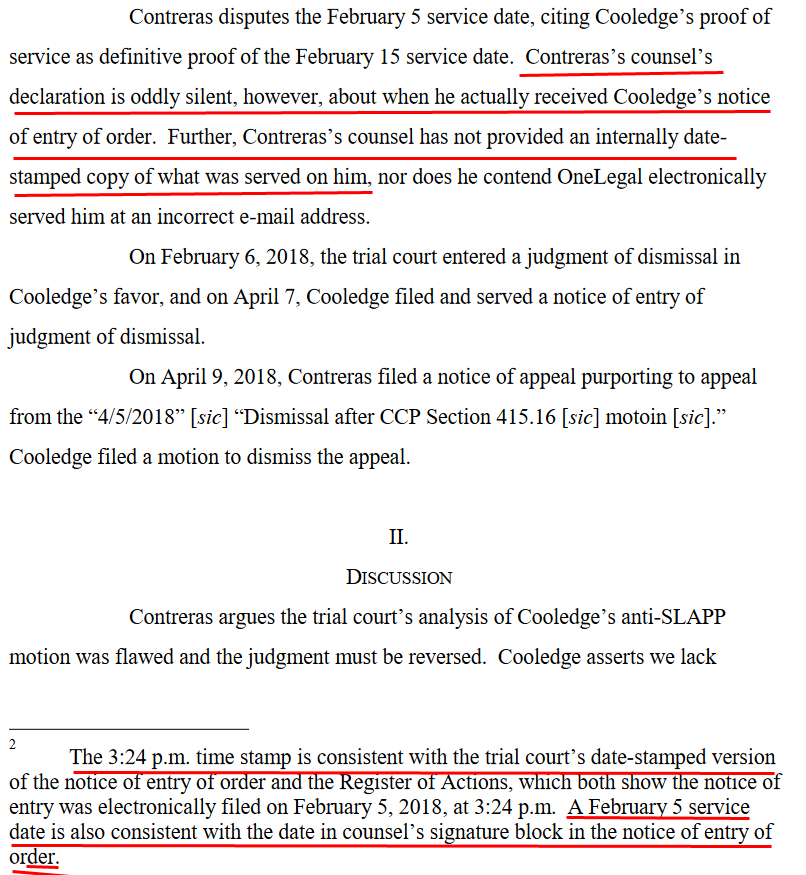
If this wasn't bad enough, the court of appeal also held Cabanday's late notice of appeal had typos and failed to identify the right order.
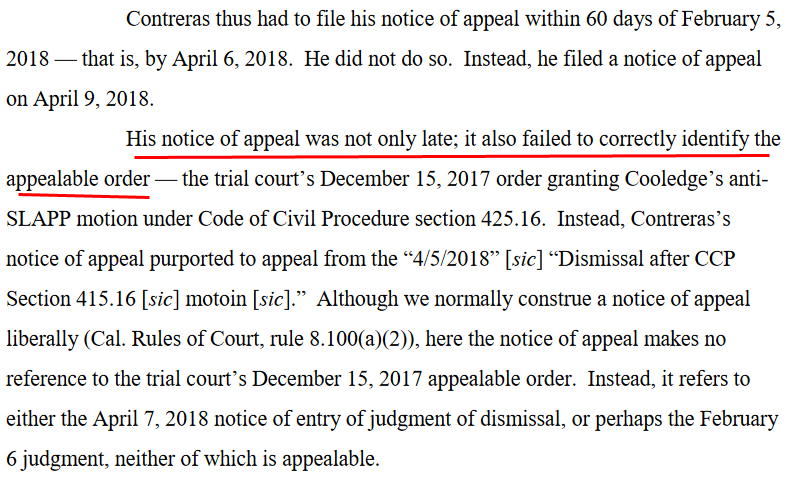
A unanimous court of appeal then dismissed the appeal.
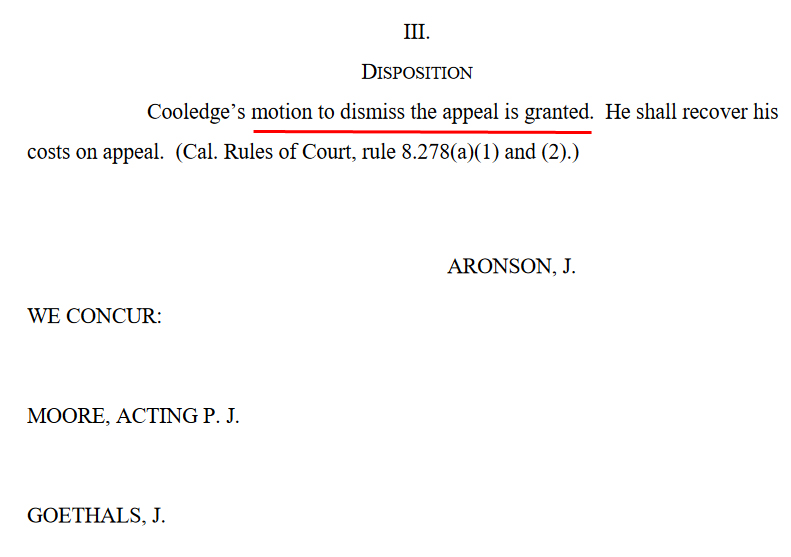
Cabanday seems like a walking malpractice lawsuit per the court of appeals opinion.
It it our understanding the loser of a SLAPP lawsuit may have to pay their opponent's legal fees. We do not know how much, if any, legal fees Cabanday's client has to pay.
We have reached out to attorney Orlando Cabanday for his comment or explanation - which may be reasonable and result in significant changes to this opinion.
In the meantime, though, we are very concerned about this part of the court of appeals opinion discussing the attorney declaration (Lawzilla has not been able to identify any attorney with the Cabanday Law Group other than Orlando Cabandy):

Our opinion is Cabanday could have easily cleared up the service issue by providing the date of the email from OneLegal serving the notice on him.
But, apparently he did not.
According to Cabanday's position he argued on appeal, he should have an email dated the 15th. If he had it we believe it would have been a major point and exhibit.
Our read of the court of appeals decision is attorney Cabanday tried to conceal important evidence from the court to cover for his untimely appeal.
In our opinion, this is dishonest.
There is a California jury instruction, we suspect Orlando Cabanday, Esq., is familiar with, which says if one fails to provide good evidence, such as the date they received an email serving a document, then their weaker evidence can be distrusted.

There is another jury instruction saying if evidence is concealed then it can be decided the evidence was unfavorable to him.

What Ethical Duties Does an Attorney Have?
According to the State Bar, the California Rules of Professional Conduct are rules designed to regulate the conduct of licensed California lawyers.
Rule 3.3 imposes two requirements on attorneys.
First, an attorney shall not knowingly make any false statement of fact to a court.
Second, an attorney shall correct any false statement of material fact made to a court.
From our interpretation of the appellate decision, in our opinion Orlando Cabanday violated both ethical rules. He falsely argued service was on February 15th when, from what we infer from the court of appeal, he probably had on his computer proof service was actually on February 5th.
We do not see anything showing that he corrected it. Instead, he argued this position to the court of appeals.
What Other Laws May Attorney Cabanday Have Violated?
California Business and Professions Code section 6068(d) prohibits an attorney from misleading a judge by making a false statement of fact.
A violation can result in discipline by the State Bar, including a potential suspension from the practice of law or disbarment.
What is the penalty when an attorney commits perjury?
The court of appeals referred to a "declaration" by counsel, the one that is "oddly silent".
Our understanding is a declaration is made under penalty of perjury. Everyone knows the promise to tell the truth, the whole truth, and nothing but the truth. We also found this referenced in California Code of Civil Procedure section 2094. We believe attorneys are held to the highest of standards.
In other words, we believe it may be perjury if one claims the date was the 15th based on a document with a typo, but they do not tell the whole truth by admitting it was a typo and concealing evidence that the real date was the 5th.
Obviously, making false statements and/or trying to mislead a court is a very serious matter. Especially when one is an attorney.
An attorney could be disciplined by the State Bar. He could be disbarred and lose his license to practice law.
Someone committing perjury can also be sent to state prison. We saw this online from the Shouse California Law Group:
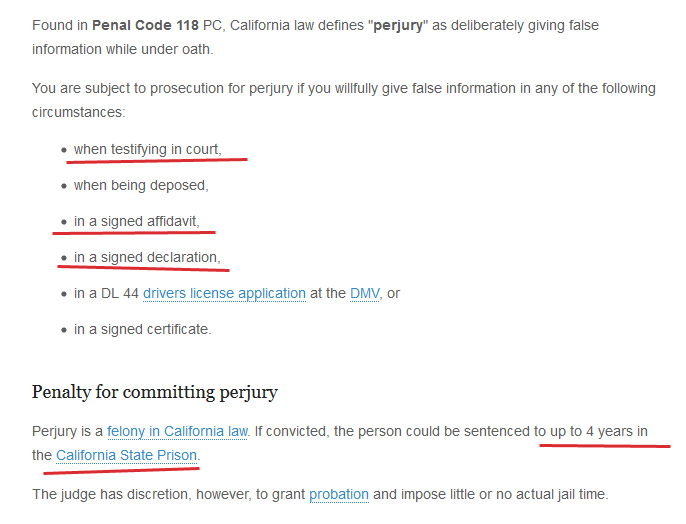
Bottom line: The court of appeal only said Cabanday's declaration was "oddly silent" and did not discuss if there was perjury. So we are not saying there was perjury or any other wrongdoing. That is a possible issue for someone else to decide.
We do not know what any email shows about the proof of service since the court of appeal says Cabanday did not provide it.
In our view we expect an attorney to be beyond approach. They do not hide evidence.
What if Cabanday's client demanded that he try to take advantage of the typo listing the 15th as the date, even though the real date was the 5th?
It is our belief an attorney in that situation should not take the position or withdraw as counsel and not present a false or misleading argument to the court. Rule 3.1 of the California Rules of Professional Conduct prohibits an attorney from asserting a position in litigation without probable cause, if this would harass or maliciously injure someone.
Orlando Cabanday was admitted to the California Bar in 1993. Bar Number 168131.
Cabanday Law Group
21151 South Western Avenue Suite 137
Torrance, California 90501
Law School: University of California Davis
